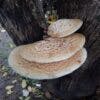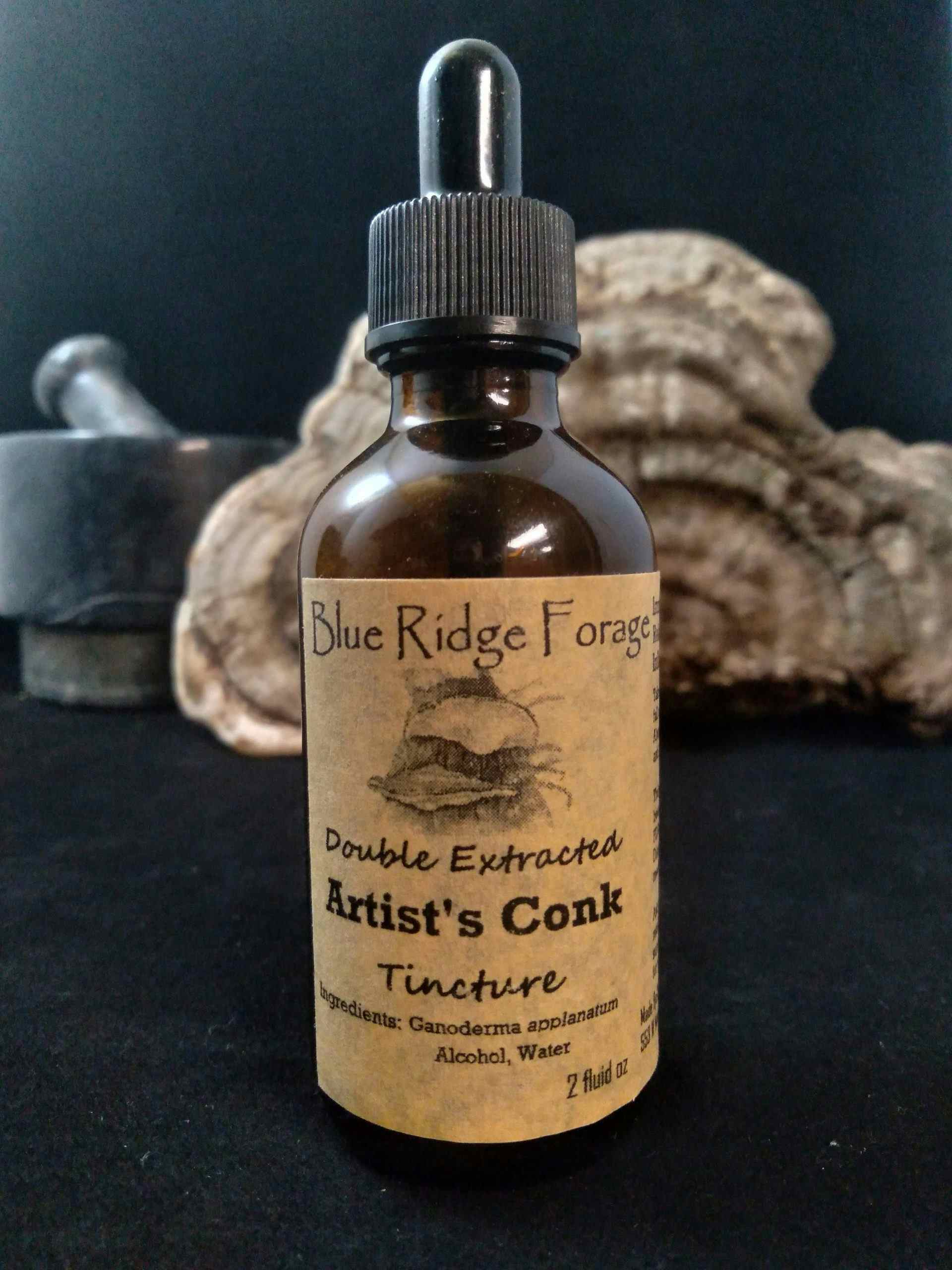The Artist conk belongs to the genus Ganoderma. This genus also contains Red Reishi, another medicinal polypore that we work with regularly. Ganoderma is derived from the Greek word ganos meaning shiny, and derma meaning skin, a reference to the many species of ganoderma with a shiny outer sheen. Ganoderma mushrooms have been used for hundreds of years as traditional medicine, with use in ancient China being detailed in descriptions dated to the first and second centuries AD.
Like all polypores, Artist conk contains a range of beneficial compounds. One such group of compounds that might sound familiar is beta glucans. Beta glucan polysaccharides are powerful immunomodulators, working in a number of ways to help improve immune function. Another group of compounds present in Ganoderma Applanatum are triterpenes. Triterpenes have been known to improve digestive and hepatic function, aid in the assimilation of nutrients, and the elimination of waste products in the body. In addition to beta glucans and triterpenes, Artist Conk has a myriad of other polysaccharides, sterols, and polyphenolic compounds that likely contribute to its medicinal properties.
Artist conk has also shown to be useful for cardiovascular health due to its ability to increase nitric oxide synthase. Nitric oxide is a vasodilator which increases blood flow through the arteries, and also plays a role in cardiac function, peristalsis and sexual arousal in men and women.
Anti-Cancer ActivityThe Artist’s Conk mushroom contains lectin, a well-researched polysaccharide that may aid in fighting cancer. In a 2017 study, researchers isolated lectin from Ganoderma applanatum and tested its ability to fight HT-29 colon cancer cells. They found that the G. applanatum-derived lectin contains cytotoxic and pro-apoptotic activities against HT-29 colon adenocarcinoma cells. Simply put, they found that the lectin from Artist’s Conk is toxic to the HT-29 colon cancer cells. A 2011 study investigated G. applanatum’s effect on gastric cancer cells and found that extracts induced apoptosis, or cell death, in the cancer cells. In a 2008 study, mice suffering from sarcoma were treated with exo-biopolymer from G. applanatum. Researchers found that as small a dose as 40mg/kg was optimal and inhibited the growth of solid tumors by 39.7% and increased the natural killer cell activity of splenocytes by 51.6% compared to the control group.
Immune SupportGanoderma applanatum has displayed immunomodulatory activity. In a 2016 study, rainbow trout were given 250, 500, and 1,000mg/kg supplements 4 times daily for a 45-day period. Immunologic parameters were then tested and showed that the numbers of red and white blood cells, hemoglobin, hematocrit, monocytes, and neutrophil levels had increased significantly for all the treated fish, and especially with the 1,000mg/kg dose. The researchers concluded Artist’s Conk has the potential to activate immunologic parameters. In a 2011 study, a compound was isolated from G. applanatum and shown to inhibit the synthesis and excretion of CXCL10, a protein which contributes greatly to chronic inflammatory conditions. The compound was designated Ganodermycin and has potential in treating inflammatory diseases, which suggests that G. applanatum has anti-inflammatory activity.
Antioxidant ActivityWhen extracted or used as a tea, the Artist’s Conk has been found to have significant antioxidant activity. In a 2012 study, researchers tested the antioxidant activity of G. applanatum and other mushrooms, where G. applanatum exhibited the highest free-radical scavenging ability, inhibition of lipid peroxidation, and reducing ability. This antioxidant activity strongly correlated to the levels of alpha-glucans, an anticancer and immunomodulatory polysaccharide, and phenolic compounds. Another study researching Artist’s Conk in combination with black tea leaf extracts found that the combination had a strong positive effect on the level of phenolic-type antioxidants.
Half a dropper per day under your tongue or added to a beverage is all you need of this super powerful supplement.

Welcome to my shop! I am a forager and tea maker of Western North Carolina. I have been growing and foraging for herbs for several years and more recently I have fallen in love with mushrooms. I've become a certified mushroom safety and ID expert and continue to further my knowledge every chance I get. My favorite thing is a hot piping cup of tea with GREAT flavor! Mushroom teas? Why not?!
Keep an eye out for seasonal flavors as the forest continues it's beautiful cycle of change.
